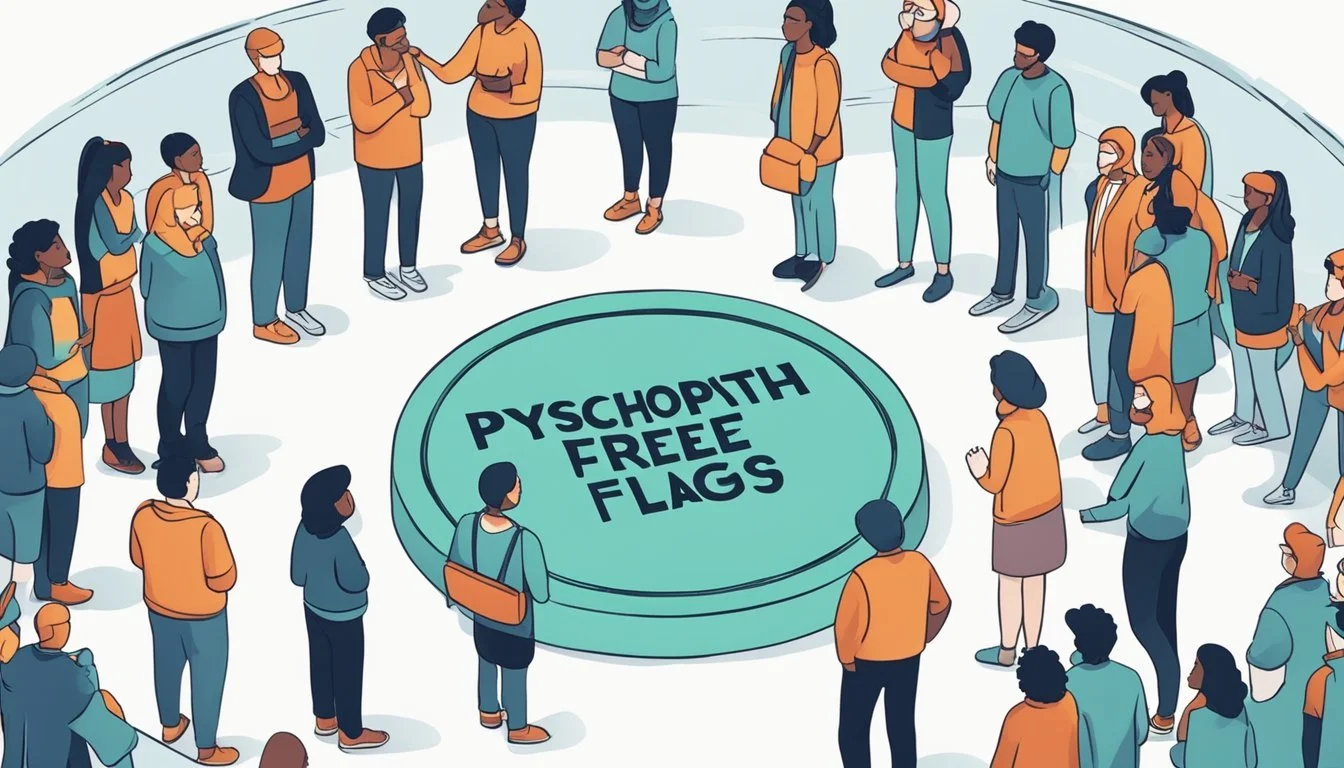Recovering from Relationships with Psychopaths
Recognizing toxic individuals early can protect your mental health and wellbeing. The "Psychopath Free 30 Red Flags" provide valuable insights into identifying potentially manipulative and harmful people. These red flags encompass behaviors like making you feel on-edge, using excessive charm, and engaging in emotional manipulation.
Understanding these warning signs empowers individuals to set boundaries and make informed decisions about their relationships. By familiarizing yourself with these red flags, you can better navigate social interactions and avoid falling victim to toxic dynamics. The knowledge gained from studying these indicators can serve as a lifelong defense against manipulative individuals.
Paying attention to your intuition and recognizing these red flags can help you maintain healthier relationships and protect your emotional well-being. Being aware of these signs allows you to spot potential issues early and take appropriate action to safeguard yourself from psychopathic or narcissistic abuse.
Understanding Psychopathy
Psychopathy is a complex personality disorder characterized by specific traits and behaviors. It's often confused with related conditions like sociopathy and narcissism.
Defining Psychopathy and Related Disorders
Psychopathy is a personality disorder marked by shallow emotions, lack of empathy, and manipulative behaviors. It falls under the broader category of antisocial personality disorder in diagnostic manuals.
Key traits of psychopathy include:
Superficial charm
Lack of remorse
Impulsivity
Callousness
Grandiose sense of self-worth
While not an official diagnosis, the term is used clinically and in research. Psychopaths often engage in calculated, predatory behavior to fulfill their own needs without regard for others.
Psychopath vs. Sociopath vs. Narcissist
Though often used interchangeably, psychopathy, sociopathy, and narcissism have distinct characteristics:
Psychopaths:
Born with traits
Lack conscience
Calculated behavior
Sociopaths:
Developed through environment
Some capacity for empathy
More erratic behavior
Narcissists:
Extreme self-focus
Need for admiration
Fragile self-esteem
While there's overlap, psychopaths tend to be more manipulative and less impulsive than sociopaths. Narcissists, unlike psychopaths, crave attention and admiration from others.
Identifying Red Flags
Recognizing the warning signs of psychopathic behavior is crucial for protecting oneself from manipulation and emotional abuse. These red flags often manifest through subtle behaviors, deceptive tactics, and attempts to exert control.
Introduction to Red Flags
Red flags are warning signs that indicate potential danger or toxicity in a relationship. They serve as early indicators of manipulative or psychopathic behavior. Recognizing these signs can help individuals avoid harmful relationships and protect their emotional well-being.
Common red flags include inconsistent behavior, excessive charm, and rapid relationship progression. Psychopaths may use flattery and intense attention to quickly win trust. They often display a lack of empathy and engage in frequent lying.
It's important to trust one's instincts when encountering these warning signs. Even if a person can't pinpoint exactly what feels off, an uneasy feeling is worth paying attention to.
Early Signs of Psychopathic Behavior
Psychopathic behavior often emerges gradually, making it challenging to detect at first. Early signs may include:
Superficial charm and charisma
Grandiose sense of self-worth
Pathological lying
Lack of remorse or guilt
Psychopaths may initially present as confident and captivating individuals. They excel at first impressions and can quickly make others feel special. However, their true nature becomes apparent over time.
They often have a history of short-lived relationships and may speak negatively about exes. Inconsistencies in their stories or frequent "misunderstandings" can indicate deceptive behavior.
Manipulation and Control Tactics
Psychopaths employ various tactics to manipulate and control their targets:
Gaslighting: Making victims question their own reality
Love bombing: Showering targets with excessive affection
Triangulation: Creating jealousy or competition with others
Silent treatment: Withdrawing affection as punishment
These individuals may use guilt-tripping or emotional blackmail to maintain control. They often shift blame onto others and refuse to take responsibility for their actions.
Psychopaths frequently engage in mind games, alternating between warmth and coldness to keep their targets off-balance. They may isolate victims from friends and family to increase dependence.
Recognizing these manipulation tactics is crucial for breaking free from toxic relationships. Victims should trust their instincts and seek support when encountering these red flags.
Effects of Toxic Relationships
Toxic relationships involving psychopathic or narcissistic individuals can have profound and long-lasting effects on survivors. These impacts extend across psychological, emotional, and behavioral domains.
Psychological Impact of Abuse
Survivors of toxic relationships often experience significant psychological distress. Many develop symptoms of post-traumatic stress disorder (PTSD), including flashbacks, nightmares, and hypervigilance. Anxiety and depression are common, sometimes leading to suicidal thoughts.
Self-esteem typically plummets as a result of constant criticism and manipulation. Victims may struggle with trust issues and have difficulty forming new relationships. Cognitive functioning can be impaired, with survivors reporting problems with memory, concentration, and decision-making.
Some individuals develop unhealthy coping mechanisms like substance abuse or disordered eating. The psychological toll can manifest in physical symptoms such as chronic pain, fatigue, and weakened immune function.
Emotional Consequences of Psychopathic Abuse
Emotional abuse in toxic relationships leaves deep scars. Survivors often feel intense shame, guilt, and self-blame for the abuse they endured. These emotions can persist long after the relationship ends.
Many experience a loss of identity and struggle to reconnect with their authentic selves. Emotional numbness is common, as victims learn to suppress feelings to protect themselves. Alternatively, some may have difficulty regulating emotions, experiencing intense mood swings.
Fear and hypervigilance can dominate daily life. Survivors may feel constantly on edge, anticipating further abuse or manipulation. This heightened state of arousal is exhausting and interferes with normal functioning.
Long-term Ramifications on Survivors
The effects of toxic relationships can persist for years. Many survivors struggle with ongoing mental health issues that require professional treatment. Relationship patterns may be disrupted, with some avoiding intimacy altogether while others repeat cycles of abusive relationships.
Career and financial stability often suffer due to lowered self-confidence and periods of mental health struggles. Physical health problems related to chronic stress are common, including cardiovascular issues and autoimmune disorders.
Some survivors experience post-traumatic growth, developing increased resilience and self-awareness. However, this process takes time and often requires significant support and personal work. Recovery is possible, but the journey can be long and challenging.
Healing and Recovery
Recovering from psychopathic abuse requires commitment, self-compassion, and professional support. Survivors can rebuild their lives by focusing on personal growth and establishing healthy boundaries.
Breaking Free from Psychopathic Abuse
Recognizing the abuse is the first step towards breaking free. Survivors must acknowledge that the relationship was toxic and not their fault. Cutting all contact with the abuser is crucial for healing.
No contact includes blocking phone numbers, social media, and avoiding places the abuser frequents. This creates space for recovery and prevents further manipulation.
Seeking therapy from a trauma-informed professional can help process the experience. Support groups provide validation and community with others who understand.
Journaling helps survivors track their progress and identify lingering effects of the abuse. Self-care practices like exercise, meditation, and creative pursuits aid emotional healing.
Strategies for Healing After a Toxic Relationship
Healing takes time and patience. Survivors benefit from establishing a daily routine that includes healthy habits. Regular sleep, nutritious meals, and exercise stabilize mood and energy.
Mindfulness techniques reduce anxiety and flashbacks. Deep breathing, grounding exercises, and guided imagery help manage trauma responses.
Rebuilding trust occurs gradually. Survivors can start with small steps like confiding in a trusted friend or family member. Professional counseling provides a safe space to work through trust issues.
Setting boundaries protects against future exploitation. Survivors learn to recognize red flags and trust their instincts. Saying "no" becomes easier with practice.
Building Self-Respect and Self-Esteem
Psychopathic abuse often erodes self-worth. Rebuilding self-esteem is essential for recovery. Positive self-talk counteracts internalized criticism from the abuser.
Making a list of personal strengths and accomplishments boosts confidence. Setting and achieving small goals provides a sense of progress and capability.
Engaging in activities that bring joy and fulfillment nurtures self-respect. Hobbies, volunteering, or learning new skills foster a positive self-image.
Surrounding oneself with supportive, respectful people reinforces healthy relationship patterns. Toxic friendships may need reevaluation as survivors reclaim their autonomy.
Self-compassion allows room for setbacks without harsh self-judgment. Recovery is not linear, and each step forward is significant.
Community and Support
Connecting with others who have had similar experiences is crucial for healing from psychopathic abuse. Support networks and resources can provide validation, understanding, and tools for recovery.
Importance of Community in Recovery
Survivors of psychopathic relationships often feel isolated and misunderstood. Joining a community of others who have been through similar experiences can be immensely healing. Online forums like PsychopathFree.com offer a safe space for survivors to share their stories and receive support.
These communities help validate experiences and combat self-doubt. Members can gain perspective on manipulative tactics and learn healthy coping strategies from others further along in recovery.
Local support groups also provide face-to-face connection. Some survivors form lasting friendships with others who truly understand their journey.
Resources for Survivors of Psychopaths
Many resources exist to help survivors heal and rebuild their lives after psychopathic abuse. Books like "Psychopath Free" by Jackson MacKenzie offer education and guidance. Online courses teach how to identify red flags and set boundaries in future relationships.
Psychologists and therapists specializing in trauma can provide personalized support. Some offer workshops on recovering from toxic relationships. Support hotlines give immediate help during moments of crisis.
Facebook groups focused on psychopathy awareness allow survivors to connect. Non-profit organizations work to raise public awareness about psychopathic abuse through education and advocacy efforts.
Prevention and Awareness
Recognizing warning signs early and establishing clear boundaries are crucial for protecting oneself from psychopathic behavior. These strategies empower individuals to foster healthier relationships and maintain emotional well-being.
Educating About Psychopathy in Relationships
Understanding the traits of psychopathy helps people recognize potential threats. Key characteristics include superficial charm, lack of empathy, and manipulative tendencies.
Learning about these patterns enables individuals to spot red flags in their interactions. It's important to trust one's instincts when something feels off in a relationship.
Support groups and educational resources provide valuable information on psychopathic behavior. These tools help people understand the dynamics of toxic relationships and how to avoid them.
Professional therapists can offer guidance on healing from past experiences with psychopathic individuals. They equip clients with strategies to recognize and respond to manipulative tactics.
Learning the Importance of Setting Boundaries
Establishing clear boundaries is essential for protecting oneself from psychopathic behavior. This involves defining personal limits and communicating them assertively.
Healthy boundaries include respecting one's own needs and values. It's crucial to enforce these limits consistently, even when faced with manipulation or pressure.
Practicing self-care and maintaining strong support networks reinforce personal boundaries. These habits help individuals stay grounded and less vulnerable to toxic influences.
Learning to say "no" without guilt is a vital skill in boundary-setting. It protects against exploitation and helps maintain healthy relationships.
Seeking help from trusted friends or professionals when boundaries are challenged can provide additional support and perspective.
Exploring 'Psychopath Free' Content
'Psychopath Free' offers valuable insights into recognizing toxic behaviors and understanding manipulative individuals. The book and associated resources provide tools for identifying red flags in relationships.
Key Insights from 'Psychopath Free' Book
The 'Psychopath Free' book outlines 30 red flags to help identify potentially harmful individuals. These warning signs include making the reader feel on-edge while still seeking approval, and dismissing questionable behavior as accidental.
The text emphasizes developing a strong intuition as a defense against manipulation. This skill, once honed, can serve readers for a lifetime.
'Psychopath Free' explores common manipulation tactics and emotional abuse patterns. It provides strategies for protecting oneself from psychopathic and narcissistic individuals.
Contributions of the Author to Understanding Toxicity
The author of 'Psychopath Free' has made significant contributions to understanding toxic relationships. Their work focuses on recognizing and avoiding manipulative people.
They've created a recovery community for survivors of sociopaths, narcissists, and psychopaths. This platform allows individuals to discuss self-respect, compassion, and forgiveness.
The author's approach combines research on psychopathic traits with practical advice for healing. Their work has helped many readers identify harmful patterns in their relationships and begin the recovery process.





